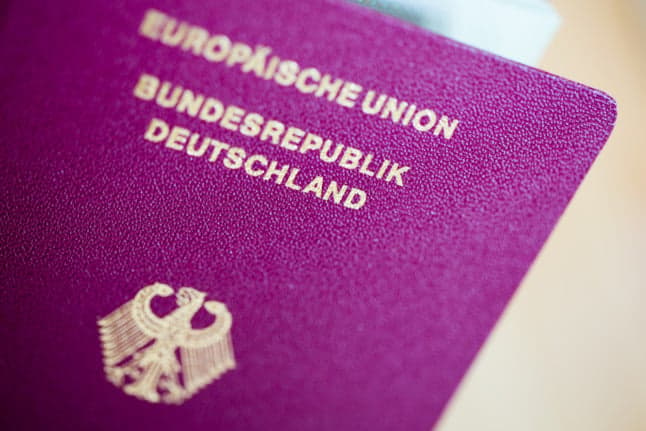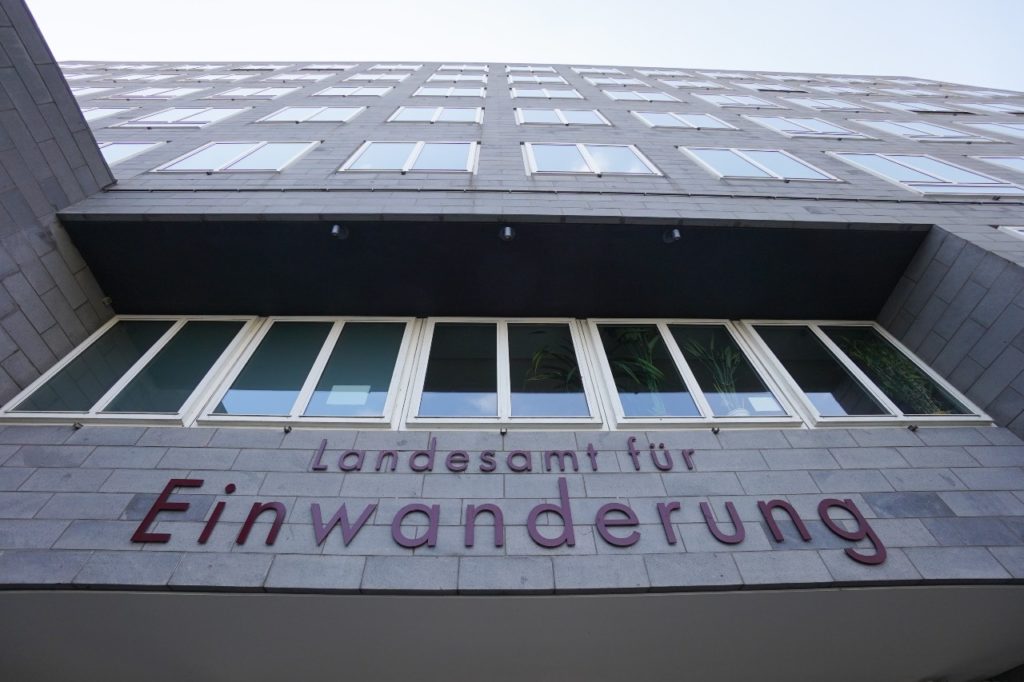‘Unconstitutional’: Berlin politicians condemn delay to citizenship applications

A draft proposal from the Berlin State Senate - which will see some citizenship applications in Berlin put on hold - has sparked anger among local city councillors.
From January 1st, 2024, anyone wanting to become a German citizen in Berlin will have to do so through a "Central Naturalisation Centre" at the State Office for Immigration (LEA). By centralising the procedure, the Senate aims to increase the number of people becoming German citizens in the city-state from around 8,000 to about 20,000 a year.
But last week, a draft concept paper on the "Centralisation of Citizenship Matters" from the Berlin Senate revealed that the transition process will likely lead to delays for many applications – sparking a backlash from local councillors.
The Local contacted the Berlin Senate Department of the Interior, Digitalisation and Sports to clarify the details of the proposal.
Sabine Beikler told The Local that the draft concept proposes that existing procedures – i.e. applications received before December 31st, 2022 - will be prioritised by the current district naturalisation offices, in order to "reduce the number of inventory procedures already processed that will be transferred to the LEA at the end of the year".
But applications received after January 1st, 2023, which “do not justify an accelerated processing requirement“ are to be processed "downstream" according to the spokeswoman – in other words, after the new central office opens next year.
READ ALSO: Why German citizenship applications in Berlin are facing delays
"The concept does not provide for a general 'processing stop'. Rather, processing of new applications should generally be given lower priority than older procedures in order to be able to complete as many existing procedures as possible and to ensure an orderly transfer of tasks", Beikler clarified.
But as a result, it seems certain that many new citizenship applications will go on hold and this has sparked a backlash from local politicians.
"It is hardly likely to be justifiable to wantonly leave an administrative procedure unprocessed for such a long period of time," Matthias Steuckardt (CDU), a social affairs councillor in the Tempelhof-Schöneberg district, told the Tagesspiegel newspaper. "This proposal is viewed very critically by the Tempelhof-Schöneberg district office."
Applications for naturalisation are expected to increase further in 2023, as many people who came to Berlin in 2015 will then reach the current eight-year minimum period of residence required to apply for citizenship.

A sign on the State Office for Immigration (LEA) on Friedrich-Krause-Ufer in Berlin. Photo: picture alliance/dpa | Jörg Carstensen
Other districts have also complained about inadequate communication from the Senate in relation to the move to a new central office.
"Unfortunately integration of the districts took place only very insufficiently and much too late", said Emine Demirbüken-Wegner (CDU), district councillor in Reinickendorf. Tim Richter (CDU), a city councillor in Steglitz-Zehlendorf, criticised the "lack of communication" that is "now leading to the greatest lack of understanding on the part of those seeking naturalization."
Objection to the centralisation
District City Councilor Steuckardt didn't just criticise the delays associated with the opening of the new central office, but also the fact that the process will be centralised in the first place. He said that he considers the procedure not to be in line with the constitution, as there is no "compelling need to carry it out under direct government responsibility," as stipulated in the Berlin constitution.
"Why is it not possible to strengthen the districts accordingly in terms of personnel and equip them with modern technology?" Steuckardt said in a written statement obtained by the Tagesspiegel. All "cries for help from the districts in recent decades for more staff" have gone unheard, he said.
However, spokeswoman for the Berlin Senate Department of the Interior, Digitalisation and Sports, Sabine Beikler, told The Local: "The districts have been intensively involved in the development of the concept for the transition of open procedures within the project. They are involved in the project working group as well as in all project instances."
Existing backlogs
According to the Tagesspiegel, as of October 2022, 21,725 naturalisation procedures had piled up in the district offices throughout Berlin. Around 5,000 of those were filed before 2021.
Like application processing times, the number of pending applications varies widely between districts.
In Marzahn-Hellersdorf, the processing time averaged one and a half years, and in Pankow up to two. The authorities in Mitte are the fastest, with five months, while applications in Reinickendorf can take between four and 20 months.
READ ALSO: EXPLAINED: How faster naturalisation in Germany 'leads to better integration'
To shorten the processing time and work through the application backlog, the Senate plans to digitise the naturalisation process more and hire around 200 employees at the "Central Naturalisation Centre". The districts currently have around 80 employees at their disposal in the naturalisation offices throughout Berlin.
Comments
See Also
From January 1st, 2024, anyone wanting to become a German citizen in Berlin will have to do so through a "Central Naturalisation Centre" at the State Office for Immigration (LEA). By centralising the procedure, the Senate aims to increase the number of people becoming German citizens in the city-state from around 8,000 to about 20,000 a year.
But last week, a draft concept paper on the "Centralisation of Citizenship Matters" from the Berlin Senate revealed that the transition process will likely lead to delays for many applications – sparking a backlash from local councillors.
The Local contacted the Berlin Senate Department of the Interior, Digitalisation and Sports to clarify the details of the proposal.
Sabine Beikler told The Local that the draft concept proposes that existing procedures – i.e. applications received before December 31st, 2022 - will be prioritised by the current district naturalisation offices, in order to "reduce the number of inventory procedures already processed that will be transferred to the LEA at the end of the year".
But applications received after January 1st, 2023, which “do not justify an accelerated processing requirement“ are to be processed "downstream" according to the spokeswoman – in other words, after the new central office opens next year.
READ ALSO: Why German citizenship applications in Berlin are facing delays
"The concept does not provide for a general 'processing stop'. Rather, processing of new applications should generally be given lower priority than older procedures in order to be able to complete as many existing procedures as possible and to ensure an orderly transfer of tasks", Beikler clarified.
But as a result, it seems certain that many new citizenship applications will go on hold and this has sparked a backlash from local politicians.
"It is hardly likely to be justifiable to wantonly leave an administrative procedure unprocessed for such a long period of time," Matthias Steuckardt (CDU), a social affairs councillor in the Tempelhof-Schöneberg district, told the Tagesspiegel newspaper. "This proposal is viewed very critically by the Tempelhof-Schöneberg district office."
Applications for naturalisation are expected to increase further in 2023, as many people who came to Berlin in 2015 will then reach the current eight-year minimum period of residence required to apply for citizenship.

Other districts have also complained about inadequate communication from the Senate in relation to the move to a new central office.
"Unfortunately integration of the districts took place only very insufficiently and much too late", said Emine Demirbüken-Wegner (CDU), district councillor in Reinickendorf. Tim Richter (CDU), a city councillor in Steglitz-Zehlendorf, criticised the "lack of communication" that is "now leading to the greatest lack of understanding on the part of those seeking naturalization."
Objection to the centralisation
District City Councilor Steuckardt didn't just criticise the delays associated with the opening of the new central office, but also the fact that the process will be centralised in the first place. He said that he considers the procedure not to be in line with the constitution, as there is no "compelling need to carry it out under direct government responsibility," as stipulated in the Berlin constitution.
"Why is it not possible to strengthen the districts accordingly in terms of personnel and equip them with modern technology?" Steuckardt said in a written statement obtained by the Tagesspiegel. All "cries for help from the districts in recent decades for more staff" have gone unheard, he said.
However, spokeswoman for the Berlin Senate Department of the Interior, Digitalisation and Sports, Sabine Beikler, told The Local: "The districts have been intensively involved in the development of the concept for the transition of open procedures within the project. They are involved in the project working group as well as in all project instances."
Existing backlogs
According to the Tagesspiegel, as of October 2022, 21,725 naturalisation procedures had piled up in the district offices throughout Berlin. Around 5,000 of those were filed before 2021.
Like application processing times, the number of pending applications varies widely between districts.
In Marzahn-Hellersdorf, the processing time averaged one and a half years, and in Pankow up to two. The authorities in Mitte are the fastest, with five months, while applications in Reinickendorf can take between four and 20 months.
READ ALSO: EXPLAINED: How faster naturalisation in Germany 'leads to better integration'
To shorten the processing time and work through the application backlog, the Senate plans to digitise the naturalisation process more and hire around 200 employees at the "Central Naturalisation Centre". The districts currently have around 80 employees at their disposal in the naturalisation offices throughout Berlin.
Join the conversation in our comments section below. Share your own views and experience and if you have a question or suggestion for our journalists then email us at [email protected].
Please keep comments civil, constructive and on topic – and make sure to read our terms of use before getting involved.
Please log in here to leave a comment.